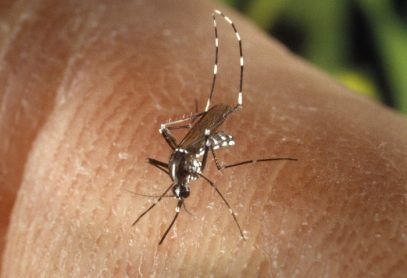
Zika Virus & Pregnancy
by
Ture Carlson and Tyler Zerwekh, DrPH
Shelby County Health Dept., Environmental Health Services Bureau
There has been a lot of news coverage on Zika virus the past couple months. Most of this media coverage has been based on a potential link between Zika virus and a congenital condition or birth defect called microcephaly.
Zika virus is not new. It was first discovered in 1947 in the Zika Forest, located near Entebbe, Uganda. In the following year, mosquitoes in the Zika Forest were found to be infected with the virus, and that was when it was thought to be a mosquito-transmitted virus. Research several years later confirmed this assumption.
In May of 2015 health authorities in Brazil reported cases of Zika in which the patients had no international travel history, indicating the virus was being locally transmitted. Local transmission means mosquitoes in that area are infected with Zika virus and are spreading it to people. In November of 2015, about six months after Zika was first detected, Brazilian authorities began to notice an increase of babies being born with below normal head sizes.
Microcephaly is a condition in which the head size remains small because the brain does not develop properly. Microcephaly has been associated with other infections like cytomegalovirus, chicken pox, and rubella if the mother has contracted them during pregnancy. Zika is just another potential infection an expecting mother may contract during pregnancy (in areas where there is risk of viral transmission).
It is important to note, current research demonstrates Zika virus has not been clinically proven to cause microcephaly. However, some evidence has led to concern for pregnant women living in or traveling to areas where Zika virus is actively circulating:
- Increase in microcephaly where Zika is being detected
- Increase in microcephaly started showing up about six months after Zika started being detected
- Zika has been found in the amniotic fluid
- Zika has also been found in the brain tissue of newborns with diagnosed microcephaly
Pregnant women planning to travel outside the U.S.A. should visit the U.S. Centers for Disease Control and Prevention’s website at http://wwwnc.cdc.gov/travel/notices to find out current health issues for their specific destination. Also any pregnant women returning from international travel should inform their physician about their travel history.
Currently, there is no available vaccine for Zika virus so it is important to take precautions and avoid contact with mosquitoes.
- Wear loose fitting long-sleeved shirts and long pants.
- Use EPA-registered insect repellents containing DEET, IR3535, picaridin, or oil of lemon eucalyptus. The U.S. Environmental Protection Agency does not recommend any additional precautions for repellent use by pregnant or nursing women. Use insect repellents as directed.
- Sleep and stay in air-conditioned and/or screened-in rooms.
Currently all of the cases of Zika virus being reported in the United States have been found in travelers returning from foreign countries. There is the potential for a traveler to return to Shelby County and infect the local mosquito population with Zika. In Shelby County there is one mosquito species out of the 48 different species currently known to be able to spread Zika to people, and that is the Asian Tiger mosquito.
Although the Asian Tiger mosquito can be found throughout Shelby County, it is more common in urban areas. It is a black mosquito with very visible white-sliver stripes on the legs and body. This mosquito has a couple of important behaviors.
- It is active during the day. The Asian Tiger mosquito is one of the few mosquitoes that will try to bite people and animals during the day. Most mosquitoes will only be active at dusk and dawn.
- Containers, Containers, Containers!!! The Asian Tiger mosquito will only lay eggs and grow in containers that can hold water. This includes but is not limited to tires, cans, buckets, gutters, bottle caps, and sometimes small ornamental ponds that are not working properly. The Asian Tiger mosquito will not lay its eggs or grow in large areas of standing water like swimming pools, flood plains, or ditches.
- The Asian Tiger mosquito is active late April/ early May until late October. It will not be found during the winter months no matter how warm it may get.
- The Asian Tiger mosquito does not fly far from where it developed. Odds are if it is biting you in your yard it came from your yard. It is very important, especially after a rain, to check your yard for anything holding water. Encourage your neighbors to do the same.

Pingback: Zika Virus: What Local Health Departments Need to Know | Healthy People, Healthy Places